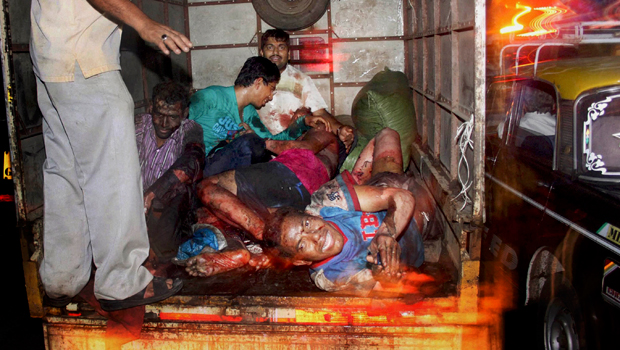India has remained jittery about the threat of militant strikes, especially since the 2008 attacks which killed 166 people and raised tensions with arch rival Pakistan.
At least 81 people were wounded on Wednesday, Prithviraj Chavan, the chief minister of the state of Maharashtra, told CNN-IBN.
“The vehicles used were scooters and motorcycles (in the attacks),” he said. Television channels also said an improvised explosive device was placed in a car, suggesting the work of local groups rather than an international terror network.
Television images showed blaring ambulances carrying away the injured at one of the attack sites. At Dadar in central Mumbai, one of the explosions left car windows shattered and uprooted electric poles.
Police were seen using sniffer digs to look for clues while local people helped paramedics carry away some of the injured.
“We heard a big blast. The building shook, the windows shattered. It was deafening,” said Aagam Doshi, a witness of the blast at the Opera House and a diamond merchant in south Mumbai.
“We came outside, and the area was filled with black smoke. There were bodies lying all over the street, there was lots of blood...We saw many bodies missing arms and missing legs.”
One blast occurred at the Opera House, an area full of diamond stores in south Mumbai near where Pakistani-based militants carried out the bloody rampage in 2008.
Another blast, also in south Mumbai, was at the Zaveri Bazaar, a big gold and silver market. The third blast was in the center of the city.
The Pakistan-based Lashkar-e-Taiba group, long focused on fighting Indian rule in Kashmir, was blamed for the 2008 attacks.
Pakistan President Asif Ali Zardari and Prime Minister Syed Yousaf Raza Gilani condemned Wednesday’s blasts in a statement.
Television footage from CNN-IBN television channel showed debris of twisted metal, motorbikes and cars severely damaged at one suspected blast site.
New Delhi says Pakistan-based groups aid and train militants to carry out attacks against India, a claim Islamabad rejects.
Home-grown militant groups are also active in the country and have in the past few years carried out attacks in large cities.
The home ministry ordered security heightened across the country.
Mumabi has over the years been the target of several attacks, including serial bomb blasts in 1993 that killed at least 260 people at the stock exchange and other areas.
In 2006, more than 180 people died when Islamist militants bombed commuter trains.










